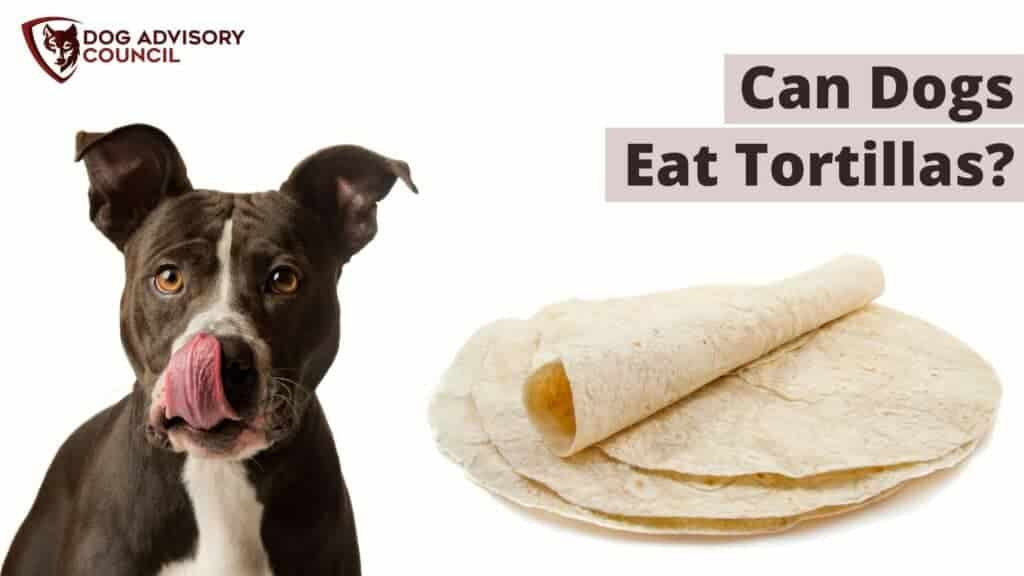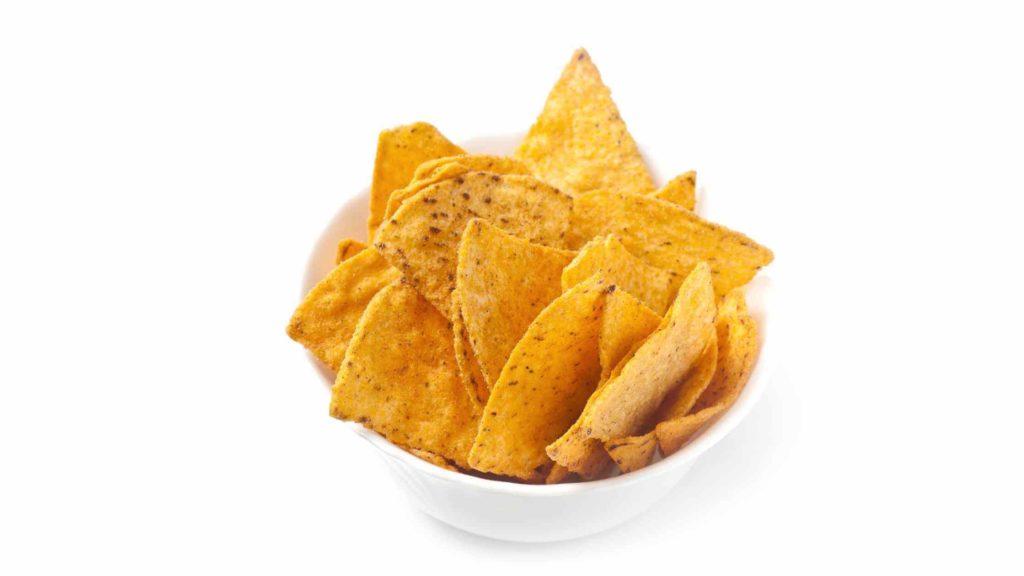
Tortillas are simply flat pieces of bread, but, can dogs eat tortillas? Let’s explore below.
You can safely give your dog plain wheat flour tortillas as well as corn tortillas and homemade tortillas. But try to keep the portions small and only share them once in a while. Don’t give your dog these if he has allergies or sensitivities to gluten or grains.
While eating tortillas is not dangerous, there is also no nutritional benefit to your dog eating them.
Can I give my dog tortillas?
Technically, sharing a bite or two of a tortilla with your dog is relatively harmless. Assuming your dog doesn’t have wheat allergies or sensitivity to gluten or grain, of course.
Both of these can be very common amongst dogs, so you might want to check about getting him tested if you are adamant about sharing your tortillas with him!
Not all tortillas are the same, though. Many people use “tortillas” for different kinds of tortillas that are out there, and all of them, so make sure you know which you want to give your dog. Not all of them are safe, particularly processed ones!
How many tortillas can a dog eat?
There is no harm for a dog to eat just one tortilla, but this is not advised. Tortillas are primarily constructed of corn and flour, and both have large carbohydrate levels with no nutritious value. Overconsumption of carbohydrates can quickly cause your dog to become obese.
If you want to give your dog a tortilla, make it an occasional treat, and be sure to keep the portions small.
What makes processing so dangerous?
When they are store-made, often in a huge commercial batch, they can come in contact with three processes that can make them dangerous or toxic to dogs. Take a look below.
- Nixtamalization
- Amylases/Xylanases
- Transglutaminases/Oxidoreductases/Proteases
Nixtamalization
The start of the tortilla-making process is Nixtamalization, the cooking of the ingredients in calcium hydroxide. If it’s food-grade, it should be okay. If it’s industrial-grade, it’s very toxic.
How do you know which they used? You don’t! So, anything from a store should be fed very carefully to your dog to make sure he’s okay.
Amylases/Xylanases
This is a preservative used in many types of store-bought tortillas to help them stay fresh for longer. For humans, it’s mostly harmless, but dog diets are preservatives-free.
Preservatives can create a pancreas disorder or complicate other medical problems for many dogs.
Transglutaminases/Oxidoreductases/Proteases
This giant word is the process for getting the consistency just right. This process is essential for tortillas, of course. However, it can damage sensitive dog stomachs since none of their food has any of this in it.
Tortillas from a store may cause problems with your dog due to all of the chemical processing used to put them on shelves. It is something to think about when comparing homemade with store-made tortillas!
What types of tortillas can my dog eat?
There are many different kinds of tortillas, many of which used interchangeably, as mentioned. Here they are, itemized for you to take a look at to see where your version lies on the list:
- Flour tortillas or whole grain tortillas
- Corn tortillas/tortillas de maiz
- Homemade tortillas
- Fried tortillas
- Spinach tortillas
- Tortilla wraps
- Tortilla chips
- Other kinds of tortilla products
Flour tortillas or whole grain tortillas
These both ingredients are the most common product that people think about with tortillas.
Both traditional white flour and whole grain flour tortillas should be safe for your dog. Just make sure they are plain (i.e., unflavored), and there’s nothing on them as toppings or sauces.
Corn/maiz tortillas
Other popular options include corn tortillas. These are actually safer for dogs to eat. They don’t have gluten, so dogs’ digestive tracts can process them easily.
Just make sure that your dog isn’t allergic or intolerant to corn flour or corn kernels! That being said, make sure they are still plain and unseasoned!
Homemade tortillas
If you want to share homemade tortillas with your dog, ask the maker what ingredients are in them!
While most homemade won’t have any of the top 3 dangerous processes, many will throw in a “pinch of this” or a “dash of that” for flavor. Harmless to humans, but dangerous for dogs.
Fried tortillas
These could be the flat yellow crunchy tortillas, or they could be in the shape of taco shells. Whichever it is, both are bad!
Fried tortillas are either deep-fried in excessive amounts of fatty vegetable oils or pan-fried in the same oils.
Both of these processes, and oils, are very bad for your dog’s stomach and health, even in small sittings. Plus, they’re dosed with salt, too, which is what makes them taste so good. Do not feed your dog fried tortillas!
Spinach tortillas
Similar to a flour tortilla, these tortillas feature spinach in their ingredients. Spinach is actually good for your dogs, so these are the least-awful option to feed your dogs, as long as there is no seasoning, etc.
Tortilla wraps
In this case, it really depends on how you define “wrap”. For some, it’s the flour tortilla often used in burritos.
For others, it could be a seasoned flour tortilla dressed for taco night. If they’re the former option, you should be okay. But, the second option is a huge no-no for reasons we’ve already discussed!
Tortilla chips
Most of us love these salty chips specifically because they’re, well, salty! These are a huge no-no. Even if they’re just the fried tortilla cracked up into pieces, or they’re salt-reduced blue corn or traditional corn chips. Or flour tortillas crisped into chips — all of these are bad for your dog.
They all feature vegetable oil in their frying technique, and most have salt on them.
Other kinds of tortilla products
Some people use the term “tortilla” to define treats like Tostito chips or Doritos. Both and all of these are bad for your dog. They have flavorings, seasonings, chemicals, and more that make them a nightmare for doggy tummies.

What happens if my dog eats regular tortillas?
If you’re here because your dog has already eaten your tortilla, don’t fear.
Flour tortillas are essentially harmless, especially if the dog only got a few nibbles or a single tortilla itself before you notice it. Your dog might have an upset stomach or an allergic reaction, depending, but that should be it.
If your dog ate a corn tortilla, you might be in for some trouble. While they’re not the worst thing ever to ingest, they can make dogs sick because their digestive tracts aren’t necessarily adapted to corn! There’s also the possibility of choking, plus salt content may give them diarrhea.
Who knows, the upset stomach may even deter him from eating it again! No? Well, we can dream…
When should I worry about my dog eating flour tortillas?
Not all dogs react the same to a seemingly harmless flour tortilla (especially in situations where they are made commercially with those top 3 problem areas). Serious signs to watch out for include:
- Lethargy or loss of consciousness
- Frantic thirst and/or sudden appetite (or lack there-of)
- Shaking and seeming in pain
- Vomiting and diarrhea
These signs could mean that there was some sort of “hidden”, harmful ingredient, such as garlic or onion, in the tortillas (both of which are very dangerous to dogs). Or it could be something like an unknown gluten allergy.
The other thing to note is that the more he eats, the more likely these health issues will be!
A few bites should be okay. If he’s eaten your entire bag, you might want to check with your vet (especially if he’s a small dog!)
What happens if my dog eats tortilla chips?
Tortilla chips, as mentioned, should be avoided. The fat is bad, but the salt is even worse.
Too much fat will create problems quickly with obesity, and organ issues, increasing pancreas issues in many dogs. Salt can cause a more severe issue called salt toxicity.
Dogs eat low sodium diets naturally, and even to human tastes, tortilla chips are very salty. Even just a handful of these can salt toxicity, and this will need to have a trip to the vet quickly. Watch out for the same symptoms listed above, especially excessive thirst.
If you’ve discovered that he’s eaten a lot of regular (i.e., not salt-free) tortilla chips, make sure he has plenty of access to water. You can also call your vet to see what they recommend. You most likely will need to bring him in. If you can, bring in the chip bag with you!
Flour tortillas may not be detrimental to your dogs’ health, but they are not a good thing for your dog, either. Keep all of this in mind next time your dog gives you those puppy eyes!
To sum up
Wheat Flour and corn tortillas should be safe for most dogs to eat occasionally, assuming he has no allergies.
You should avoid giving your dog tortilla chips, fried tortilla products, and anything with spices or flavorings.
Know someone who could use a refresher on doggy-dos and don’ts as far as the dinner table is concerned? Consider sharing this with them!
